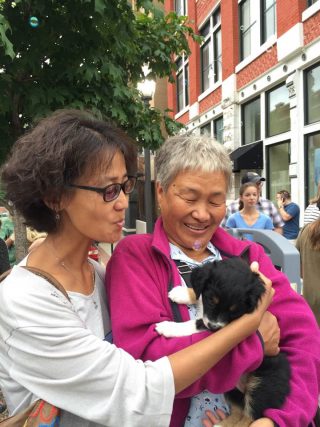Meet your Fulbrighter
Seeing it through: Oyuntugs ‘Oyut’ Bayaraa’s story
Oyuntugs Bayaraa (35) was born and raised in Ulaanbaatar, the capital of Mongolia. Bayaraa, who is in the US for the first time in her life, is now on a Fulbright scholarship and started her Masters in Rehabilitation Counseling, this fall at the University of Arkansas in Fayetteville. She considers this rehabilitation course as part of her destiny. Oyuntugs explains that I must use her first name when addressing her as that is the way of the Mongolian culture. had full eyesight before she started gradually losing it at the age of 22 years; due to the side effects of the medication she was taking at the time to treat Glaucoma. In 2008 she lost complete sight in her right eye and now remains with ten percent vision on her left eye. “I am eternally related to disability, blindness in particular,” she says. Upon completion of her degree and in the Fulbright spirit, Oyuntugs will go back to Mongolia’s capital with the intention of starting her own rehabilitation center dealing specifically with people living with a disability. She recalls that there are roughly 108 000 people living with a disability in Mongolia and only 3% percent of them are employed, let alone fulltime.
The aim of her rehab center will be to provide comprehensive training to develop marketable, professional skills for her future clients; even those in rural areas of Mongolia. At the moment there is only one such center in her country and it is found in Ulaanbaatar. “It is important to change the perfections of people living with disabilities. To give them a positive outlook on life and to give them skills that can empower them and make them competent in the labor field,” says Oyuntugs. Her career was advancing well before she was affected by the side effects of the eye medication. She had worked for various non-profit organizations and for seven years she worked in a commercial bank as an English language interpreter. Due to her disability, her career regressed together with her income. “I used to have great work performance and would always get promoted but constant eye surgeries kept me away from work and eventually cost me my jobs”.
Her work life reached a point where she was no longer able to perform her duties and was let go. So despaired at losing her job she spent the next four years of her life sitting at home in a ‘comfortable’ armchair and growing more ‘pessimistic’ by the day. It was difficult for her to transition into her new state of life. “At that rate I knew that I would be completely blind by the age of 40 or 50 years and that is why I wanted to work hard while I could to save for my later years,” she says. Oyuntugs shares that depression is common and ‘natural’ for people living with a disability and it is therefore necessary to interact with others in the same position to share experiences and opinions and ease the stress, “The most important thing is to lead a meaningful life.”
She says people with a disability tend to have little to a no social life. Simple things like going shopping are a huge chore. “I can’t really go to movies after class to distress or go on a date and meet up with friends for a drink. Basically I cannot do things people do regularly to re-energize themselves.” She is grateful for tools such as the laptop. She uses the Internet for its talking applications and for finding music and other interesting materials she wants to read. Her laptop is inserted with a screen reader; this tool reads everything that is put on the screen. On campus, Oyuntugs receives assistance from the Center for Educational Access; who help her convert textbooks into word so she can listen to them on her laptop. Her mother accompanied her to the USA. Initially, they walked everywhere together and now she is more familiar with her surroundings and can catch the bus and walk alone on campus. “When I walk with my cane on my own I feel so happy and independent,” says Oyuntugs.
Before she gained her Fulbright Scholarship she worked for the National Federation of the Blind (Mongolia) and had been with the non-profit organization for two-and-a-half years. One of the leaders of this non-profit, who is also blind, gave her the opportunity to work with them and she never forgets this second lease on life she was given. In this sense, Oyuntugs aims to pave a path, one for the young generation and many other youth in her position needing leadership and guidance. She sees education as one way of freeing herself from the possible sedentary lifestyle her disability brings. Education also gives her a chance to advocate for her peers. “I see it important to raise my profile through education. So I can interact on the necessary level with policy makers and leaders, those who make the decisions. I do see myself as an advocate for people living with a disability, she adds.
Contributor: Boitshepo Balozwi, A Fulbright grantee from Botswana
